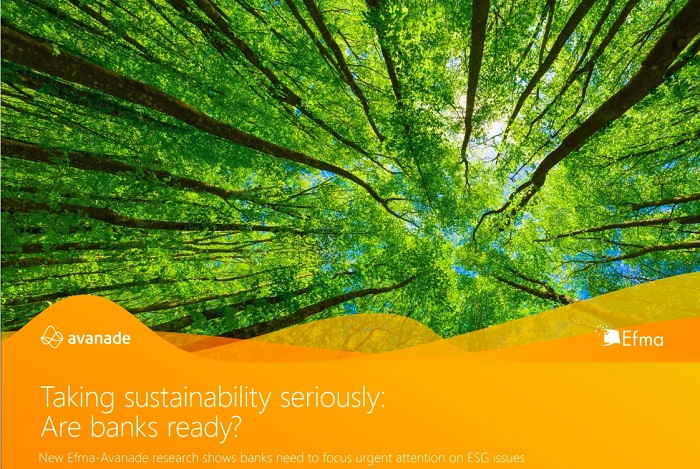- Poor data management is key obstacle to banks achieving their ESG goals
- 70% see ESG work having positive impact on market reputation, credibility

A new report from Avanade, a leading Microsoft solutions provider, and Efma, a global non-profit organization created by leading banks and insurers, has found that many banks are not on course to meet their environmental, social and governance (ESG) goals.
The report, entitled “Taking sustainability seriously: Are banks ready?”, highlights how banks and financial institutions are under increasing regulatory pressure to track and monitor their ESG progress, revealing that:
- Half of banks (53%) will be ready for regulatory reporting in the next six months, whereas almost 1 in 5 (18%) are still unclear as to what the requirements are and almost one third (29%) will not be ready for at least another year.
- Over half (57%) admit they will not hit net carbon zero operations until 2025. Only 15% stated they had already achieved this position, while just over a quarter (26%) said they will be carbon neutral in the next 12-24 months.
- Only 1 in 4 have a climate risk model ready now. A third (34%) plan to be in that position in six months. The rest (42%) will not be able to test the impact of various climate scenarios for at least a year, with 12% having to wait two years.
- Data integration is the biggest challenge to climate risk analysis. Almost a third of banks (32%) are struggling with the lack of integration of climate risk data with their risk management framework.
The majority of banks (70%) see their ESG work as having a positive impact on their market reputation and credibility. This was the top benefit, followed by balance sheet protection (50%), attracting younger groups of consumers, such as Millennials and Gen Y/Z (44%) and better energy and waste management (34%).
In addition, increasing ESG investment options to attract younger customers is now the top priority for banks (42%), followed by greater transparency on the transition to a low carbon footprint (36%), fuller disclosure and reporting (34%) and a greener product portfolio (32%).
The release of the report comes on the heels of Avanade introducing two new solutions in the market last week, based on Microsoft’s Cloud for Sustainability which combine data, green software and the power of the cloud, to enable clients to make a meaningful impact on their sustainability goals.
Varun Kumar, Southeast Asia Financial Services Client Group Lead at Avanade, says: “As trusted and indispensable institutions in society, banks have a unique opportunity to lead in the world’s sustainability efforts. But banks need to move early. In this critical race for the future, the winners are the ones that move the fastest and make the most meaningful impact on climate change.”
“Banks have moved beyond merely including ESG goals in their mission statements,” says John Berry, CEO of EFMA. “Banking leaders do not view sustainability as a challenge, but a major opportunity – probably the biggest one over the next decade.”
If banks are to meet the challenges of successfully transitioning to a low carbon economy, they will need to focus on five areas, said Avanade:
- Showing full transparency in their operations
- ‘Lean into green’ through their product portfolio to appeal to younger customers
- Creating robust stress testing and scenario analysis for climate risk
- Leveraging technology to capture data more effectively in order to generate better reporting, scenario planning and risk management
- Making hard choices about where to disinvest completely to demonstrate a clear transition program to a low-carbon investment portfolio.
For more information about the challenges facing banks, as well as how technology can help them to achieve their ESG goals, download the full report here.
Methodology
Efma and Avanade conducted online research between November 2021 and February 2022. The survey had 51 respondents from Europe (68%), North America (16%), Asia Pacific (10%) and Africa (6%), covering 25 countries. In addition, Efma conducted ten in-depth qualitative interviews with executives, including from Maybank in Malaysia]

